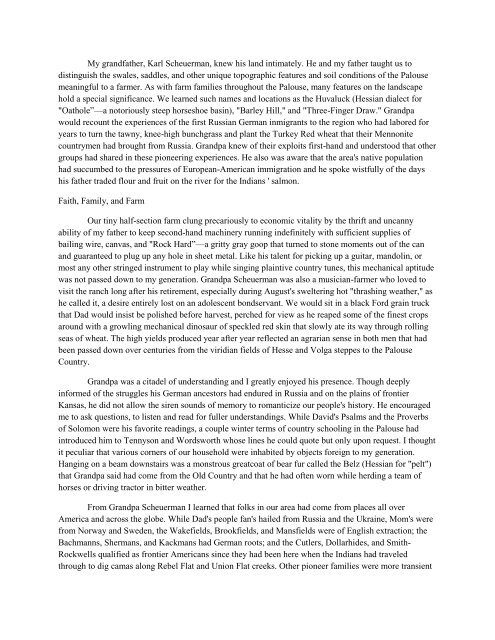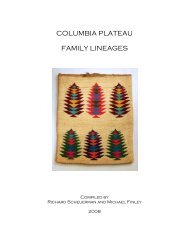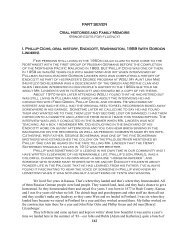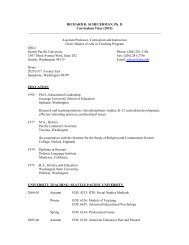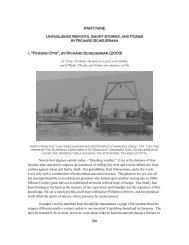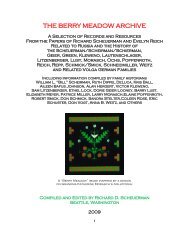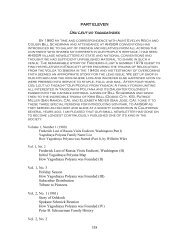A Heritage of Hills - Mountain Light School
A Heritage of Hills - Mountain Light School
A Heritage of Hills - Mountain Light School
You also want an ePaper? Increase the reach of your titles
YUMPU automatically turns print PDFs into web optimized ePapers that Google loves.
My grandfather, Karl Scheuerman, knew his land intimately. He and my father taught us to<br />
distinguish the swales, saddles, and other unique topographic features and soil conditions <strong>of</strong> the Palouse<br />
meaningful to a farmer. As with farm families throughout the Palouse, many features on the landscape<br />
hold a special significance. We learned such names and locations as the Huvaluck (Hessian dialect for<br />
"Oathole”—a notoriously steep horseshoe basin), "Barley Hill," and "Three-Finger Draw." Grandpa<br />
would recount the experiences <strong>of</strong> the first Russian German inmigrants to the region who had labored for<br />
years to turn the tawny, knee-high bunchgrass and plant the Turkey Red wheat that their Mennonite<br />
countrymen had brought from Russia. Grandpa knew <strong>of</strong> their exploits first-hand and understood that other<br />
groups had shared in these pioneering experiences. He also was aware that the area's native population<br />
had succumbed to the pressures <strong>of</strong> European-American immigration and he spoke wistfully <strong>of</strong> the days<br />
his father traded flour and fruit on the river for the Indians ' salmon.<br />
Faith, Family, and Farm<br />
Our tiny half-section farm clung precariously to economic vitality by the thrift and uncanny<br />
ability <strong>of</strong> my father to keep second-hand machinery running indefinitely with sufficient supplies <strong>of</strong><br />
bailing wire, canvas, and "Rock Hard”—a gritty gray goop that turned to stone moments out <strong>of</strong> the can<br />
and guaranteed to plug up any hole in sheet metal. Like his talent for picking up a guitar, mandolin, or<br />
most any other stringed instrument to play while singing plaintive country tunes, this mechanical aptitude<br />
was not passed down to my generation. Grandpa Scheuerman was also a musician-farmer who loved to<br />
visit the ranch long after his retirement, especially during August's sweltering hot "thrashing weather," as<br />
he called it, a desire entirely lost on an adolescent bondservant. We would sit in a black Ford grain truck<br />
that Dad would insist be polished before harvest, perched for view as he reaped some <strong>of</strong> the finest crops<br />
around with a growling mechanical dinosaur <strong>of</strong> speckled red skin that slowly ate its way through rolling<br />
seas <strong>of</strong> wheat. The high yields produced year after year reflected an agrarian sense in both men that had<br />
been passed down over centuries from the viridian fields <strong>of</strong> Hesse and Volga steppes to the Palouse<br />
Country.<br />
Grandpa was a citadel <strong>of</strong> understanding and I greatly enjoyed his presence. Though deeply<br />
informed <strong>of</strong> the struggles his German ancestors had endured in Russia and on the plains <strong>of</strong> frontier<br />
Kansas, he did not allow the siren sounds <strong>of</strong> memory to romanticize our people's history. He encouraged<br />
me to ask questions, to listen and read for fuller understandings. While David's Psalms and the Proverbs<br />
<strong>of</strong> Solomon were his favorite readings, a couple winter terms <strong>of</strong> country schooling in the Palouse had<br />
introduced him to Tennyson and Wordsworth whose lines he could quote but only upon request. I thought<br />
it peculiar that various corners <strong>of</strong> our household were inhabited by objects foreign to my generation.<br />
Hanging on a beam downstairs was a monstrous greatcoat <strong>of</strong> bear fur called the Belz (Hessian for "pelt")<br />
that Grandpa said had come from the Old Country and that he had <strong>of</strong>ten worn while herding a team <strong>of</strong><br />
horses or driving tractor in bitter weather.<br />
From Grandpa Scheuerman I learned that folks in our area had come from places all over<br />
America and across the globe. While Dad's people fan's hailed from Russia and the Ukraine, Mom's were<br />
from Norway and Sweden, the Wakefields, Brookfields, and Mansfields were <strong>of</strong> English extraction; the<br />
Bachmanns, Shermans, and Kackmans had German roots; and the Cutlers, Dollarhides, and Smith-<br />
Rockwells qualified as frontier Americans since they had been here when the Indians had traveled<br />
through to dig camas along Rebel Flat and Union Flat creeks. Other pioneer families were more transient


